Issue 127: The Reading Life of... Janet Asante Sullivan
On midlife, notebooks, and the permission to change
But little by little,
as you left their voices behind,
the stars began to burn
through the sheets of clouds,
and there was a new voice,
which you slowly
recognized as your own— Mary Oliver, Dream Work
I discovered the way I find many favorite things—by accident, through a post about her solo trip to Norway. She was traveling alone, observing closely, writing clearly. It wasn’t a dispatch from someone seeking to escape her life, but from someone who had learned how to inhabit it.
As I kept reading, I came to see Janet as someone with a remarkable relationship to change. Not in the performative sense so often offered to women, but a quieter, more internalized version. Last year, at 47, Janet picked up a paintbrush for the first time. Not as a lark but out of genuine curiosity. She didn’t reinvent herself. She simply stumbled upon something that was already there, “quietly waiting to be embraced”. One year later, she is preparing for her first solo show. There is something deeply compelling about a discovery like this, especially in midlife. Contemporary culture tends to flatten women at this stage—wife, mother, worker, caretaker—just as our edges get sharper. But Janet’s story reminds me that there are parts of us we haven’t met yet. Talents we haven’t touched. Rooms we haven’t opened.
That she is also a reader and an avid journaller makes sense. Janet is the kind of person who notices things, who’s drawn to a long interior arc. I wanted to talk to her not only because she’s doing something beautiful with her life but because she’s doing it in a way that feels true. I’m so glad to share her reading life with you now, during the week of her solo show, as she steps fully into this new creative chapter. She is, very clearly, our people.
P.S. All images in this post are by Janet and used here with her explicit permission.
Tell me a little bit about yourself. What role do books and reading play in your personal and your professional life?
I’m a 48-year-old Ghanaian-born woman (which still feels wild to say) who moved to the U.S. at the age of eight with my parents. I’ve spent most of my life in the DC metro area. For over 20 years, I led human resources for a number of organizations, and in 2018, I launched my own leadership development and executive coaching practice. I now work with law firms, tech companies, and nonprofits, helping leaders grow through training and coaching. I feel deeply grateful to work for myself and do what I love. I’m also a visual artist, oil painting is my medium and I share my creative practice and love of art here on Substack. I’m a mom of three: two adult children who have launched into the world and one 17-year-old who’s nearly there.
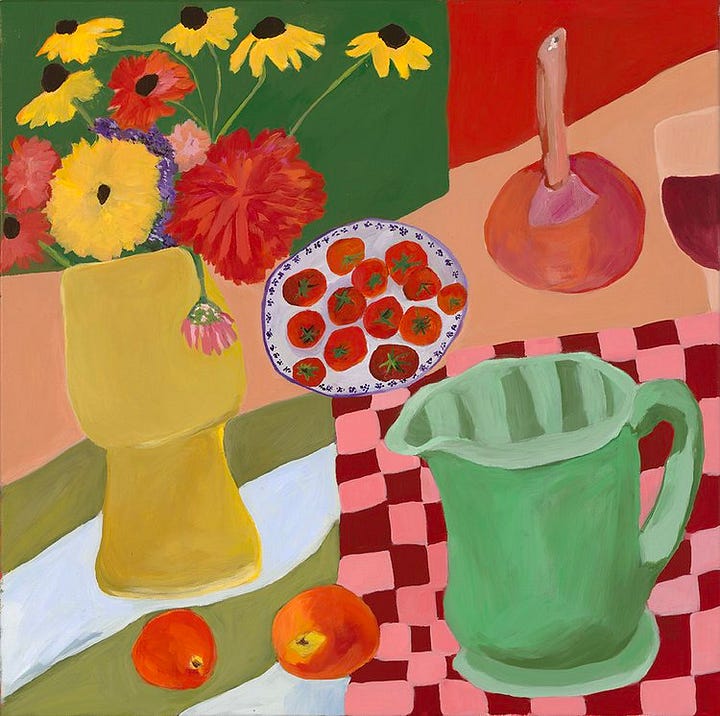


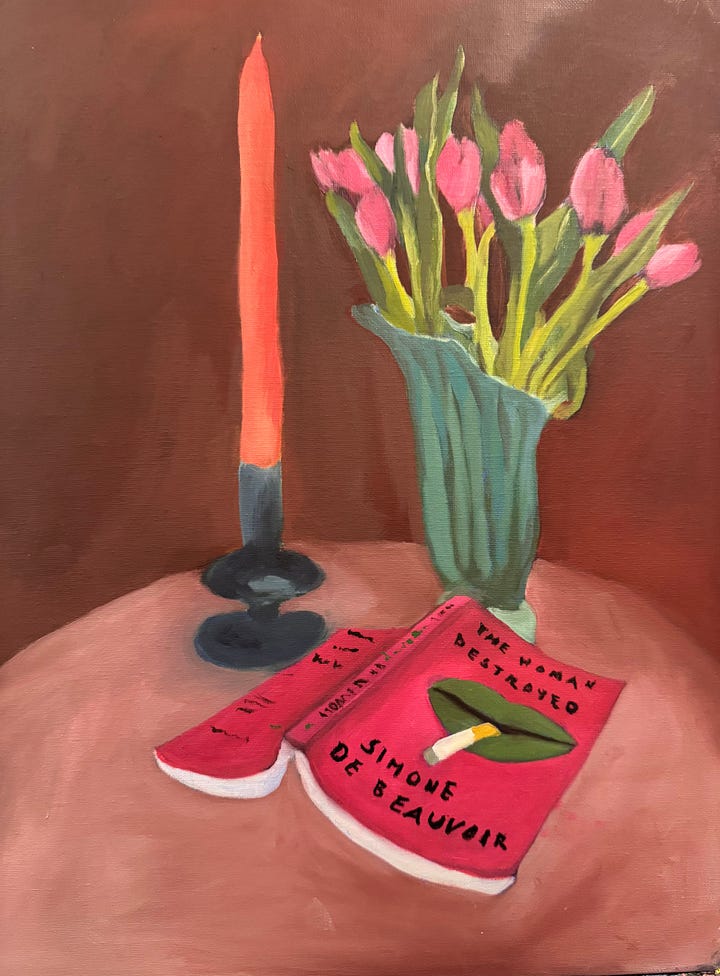
Books have played a huge role in both my personal and professional life. I was always the nerdy kid with a book in hand, reading late into the night with a flashlight. But for much of my youth and well into adulthood I wasn’t reading what I’d now call great literature. I devoured titles by Danielle Steele, James Patterson, the Babysitters Club book series, books I have no desire to revisit today. As a child of the ’80s and ’90s, with plenty of lazy summer days and no social media or phones to distract me, I wish I had encountered books by Richard Wright, Toni Morrison, Ann Petry, Chinua Achebe, or Simone de Beauvoir. I could go on and on about how the books of your formative years shape your thinking and outlook. While reading the Babysitter’s Club books as a youth was entertaining, I was at the same time consuming lives/images/ideas that were monolithic and had no signs of people who looked like me or those with immigrant stories. So yeah, I wish I had exposure to other books. I didn’t get to the literature that suits my taste until my early thirties, when I joined a book club where we set out to read all African literature. My mind was blown to discover such a world of life-affirming books. Those books challenged me and gave me confidence and language for ideas and sentiments that I had long held.
PKG: I had a similar experience and read in an eager but confused way through my late 20s and into my 30s. For everyone who reads but still doesn’t feel like they are browsing in the wrong library isle, keep going. You will find your books!
In terms of reading’s impact on my professional life, I see it as a crucial aspect. Reading literature has made me a better, more confident, and more sophisticated conversationalist. When I say sophisticated, I don’t mean snobbery—I mean the ability to see nuance, hold paradoxes, and understand people from different generations and backgrounds, and be comfortable in my own stance on things. Reading makes me a better leadership development facilitator. As a facilitator, people often ask me for book recommendations for business professionals. They are usually surprised when I say I don’t really like or recommend business-related books. I believe that to be a stronger leader, you should read literature written by people from all corners of the world. I once spent a year reading books by Iranian authors, and it was better than any business book on values or navigating change and transitions.
What are you reading right now?
It’s summer so my reading attention span is much shorter than my fall and winter reading schedule. I tend to read books that are less than 250 pages around this time of year. I am reading two books, Outline by Rachel Cusk and Rites of Passage by Richard Wright.
On an average week, how much do you read and when?
I read about five hours a week, usually an hour before bedtime. My family often teases me, Well, well, it’s 8:30 pm, Mom is retiring to her bed chambers. I head upstairs around 9 p.m. each night and read until I’m tired. This is my routine most Monday through Thursday evenings. On Sundays, I usually read in the mornings. I also always have a book in my tote bag. I read in the in-between moments - waiting rooms in doctor’s offices, trains, etc.
What do you like to read? How has your taste changed over the years?
I like to read novels, especially those that explore the inner lives of women—women on the precipice of change, seeking solitude, making meaning out of life. I also enjoy books that share the life experiences of people from different parts of the world. If a book is told from the perspective of someone in Africa, descended from Africans, or from the Middle East, Asia, or Europe, I’m interested. I like to be transported to worlds beyond the American perspective.
My taste has stayed pretty much the same over the years, but in the last two years or so, I’ve started incorporating “Western classics” into my book stack. These are books I often see people rave about but haven’t read myself. I have a curious personality, and I don’t like feeling out of the loop when the same book keeps being praised. I’ve started picking up books that dominate public discussions, not necessarily because I’m drawn to them, but because I value being able to engage with them critically and personally. It’s important to me to experience these books firsthand and form my own perspective, rather than relying on secondhand interpretations. For instance, when I first joined Substack last year, folks were going on and on about Sylvia Plath’s The Bell Jar. I read it just to understand the hype. Honestly, I found it quite depressing but it satisfied my curiosity and gave me my own point of view in the conversation. I also found it interesting that with all the praise, no one mentioned the constant othering of people in the book. I don’t like to apply today’s values and outlook on books written in another era but I do think that when it’s hailed, it should be part of the discussion, not as a judgement but a matter of fact.
PKG: I absolutely loved reading this reframe around reading popular books. I have a contrarian streak in me that makes it hard for me to pick up over-hyped books. But I love this perspective — read this stuff so that you can form your own judgement.
What's a reading ritual or habit you've developed that's unique to you?
Almost every morning, I read one or two poems or flip through one of my art or home design coffee table books. I take my time with the captions and introductions, slowly absorbing the images. I usually have a cup of tea in hand, a vase of flowers nearby, and a quiet house. In between the pages, I also pause to watch the morning light bounce off the walls or take in the mood of a cloudy sky. I call this my version of “morning pages,” since I never quite stuck with the actual journaling exercise. This ritual lets me ease into the day with my attention on beauty, through images and poetry.
Do you take notes while you read? If yes, are you particular about your materials - notebooks, pens, highlighters vs. pencils, etc?
I take notes and jot down thoughts in my Leuchtturm journal, which I’ve dedicated to topics I’m self-studying. I am currently doing a self-study on the topics: silence, solitude and time. So I recently finished reading Walden by Henry David Thoreau and Journal of Solitude by May Sarton. I took notes on their thoughts on these three topics in my journal. I also use pens to underline sentences that resonate. I later copy those sentences or phrases into my commonplace journal. At least once a month, I find myself in a café with my commonplace journal, transferring the passages I’ve marked. I also use lots of little sticky tabs to index pages I want to return to later.
How do you keep track of what you want to read? How do you decide what to read next?
I used to use Goodreads to track the books I’ve read, but out of the blue last year, I got tired of the app and spent an afternoon handwriting everything I’d entered into Goodreads over the course of over a decade into a physical journal. I now use that journal to track my reading. I enjoy writing out the titles by hand and jotting down short notes about each book.
PKG: Of all things books and notebooks related, the one thing that I want to peer-pressure you all into is to discard GoodReads and other online trackers and switch to keeping a reading log on paper. It is such a shockingly satisfying and fulfilling experience.
When people ask me how come I read as much as I do, I frequently just give them a list of things that I don’t do as regularly as I probably should: exercise, clean house, spend time with friends. What do you choose NOT to do in favour of reading?
I’d say greatly reducing my social media consumption is what I’ve given up in order to turn to books more. Also I choose not to waste the in-between/waiting periods of my day. I always have a random book in my car and several bags. I constantly keep a book of poetry nearby for the in between moments.
What is one book that you find yourself recommending to people over and over and over again?
Zenzele: A Letter for My Daughter by J. Nozipo Maraire written in 1996. A novel about a Zimbabwean mother writing to her daughter as she prepares to study abroad, sharing personal stories and timeless wisdom on love, identity, colonialism and how to show up in the world when you are leaving your homeland to experience a new world.
Thank you, Janet, not only for answering my nosy questions but also for so generously letting me use your images. This post is a visual feast because of the beauty you bring into the world through your art and your presence.
🤓 And now… some questions for you guys:
Which of Janet’s tips and ideas resonate the most with you?
Have you ever uncovered a creative impulse or talent later in life that surprised you? What happened when you followed it?
Is there a book—or a kind of reading ritual—that has helped you hear your own voice more clearly?



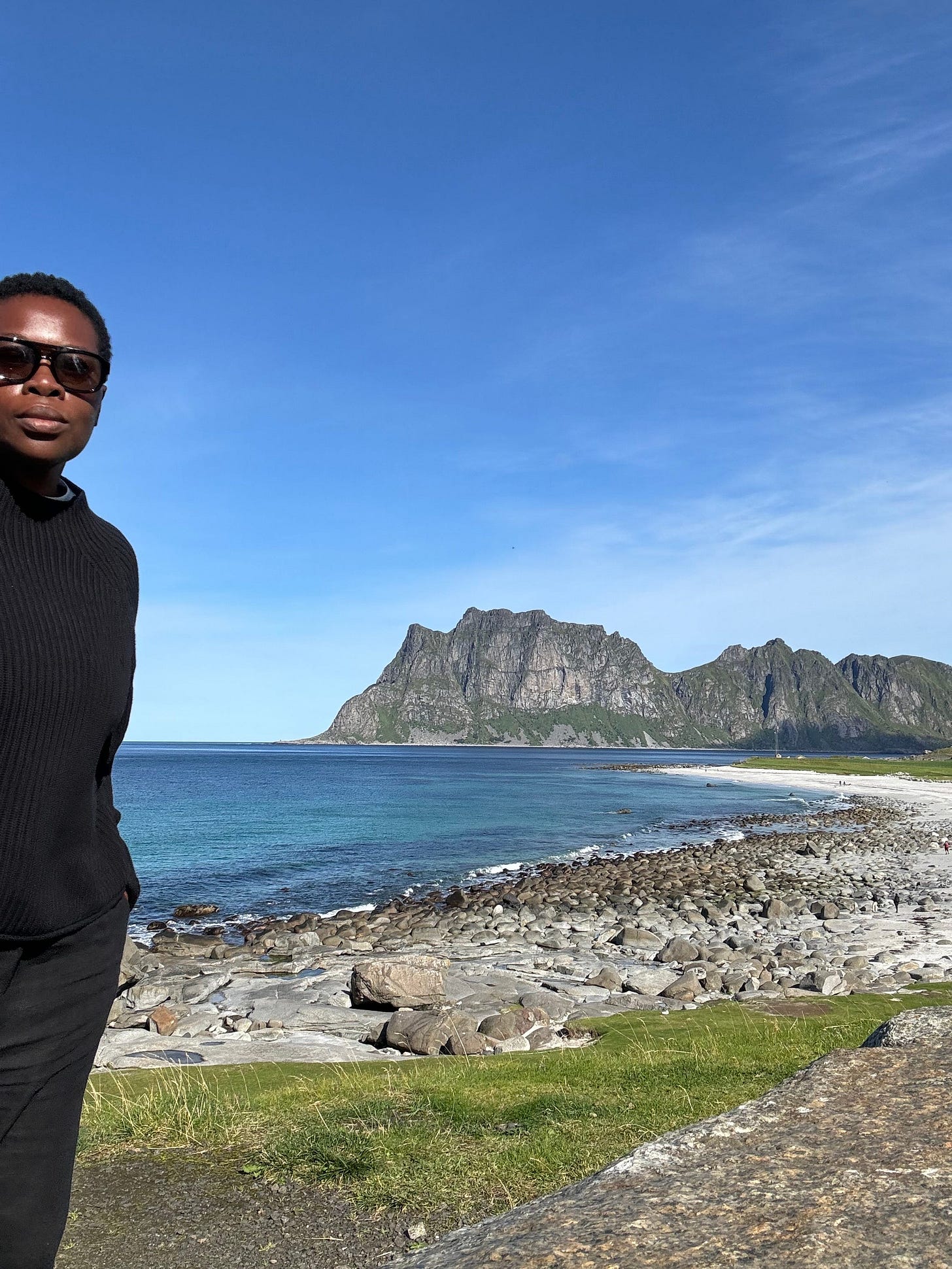

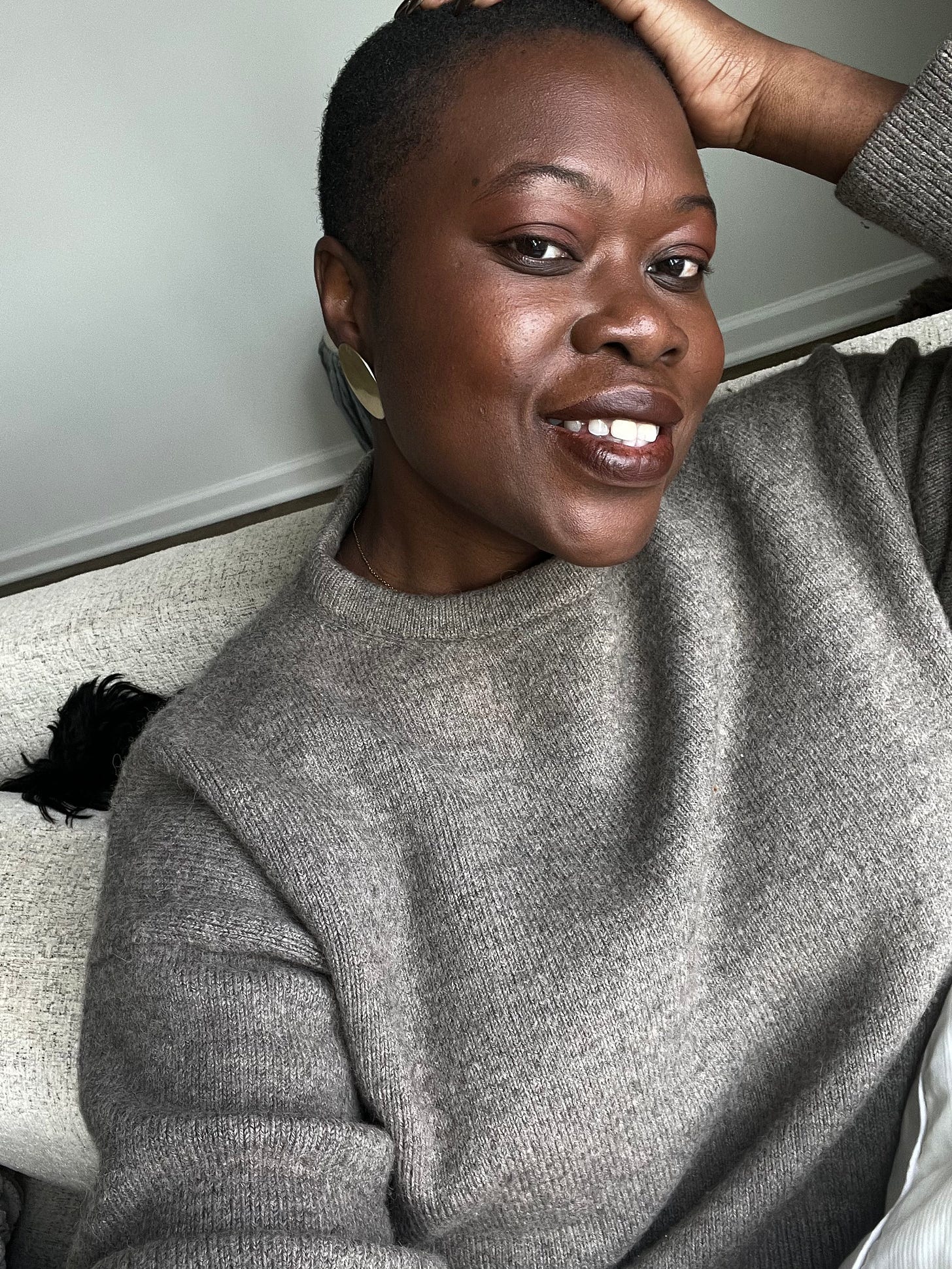
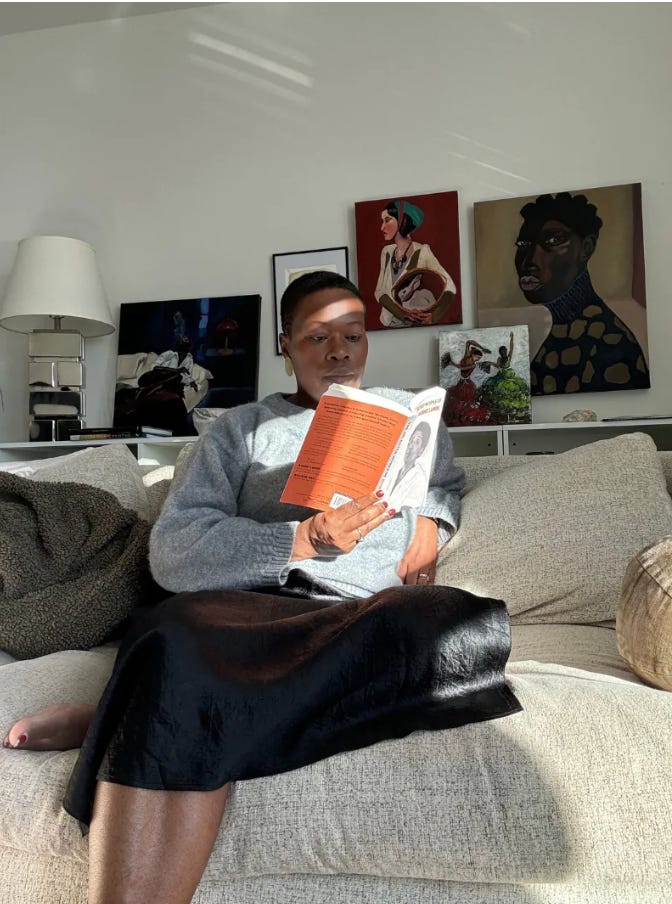
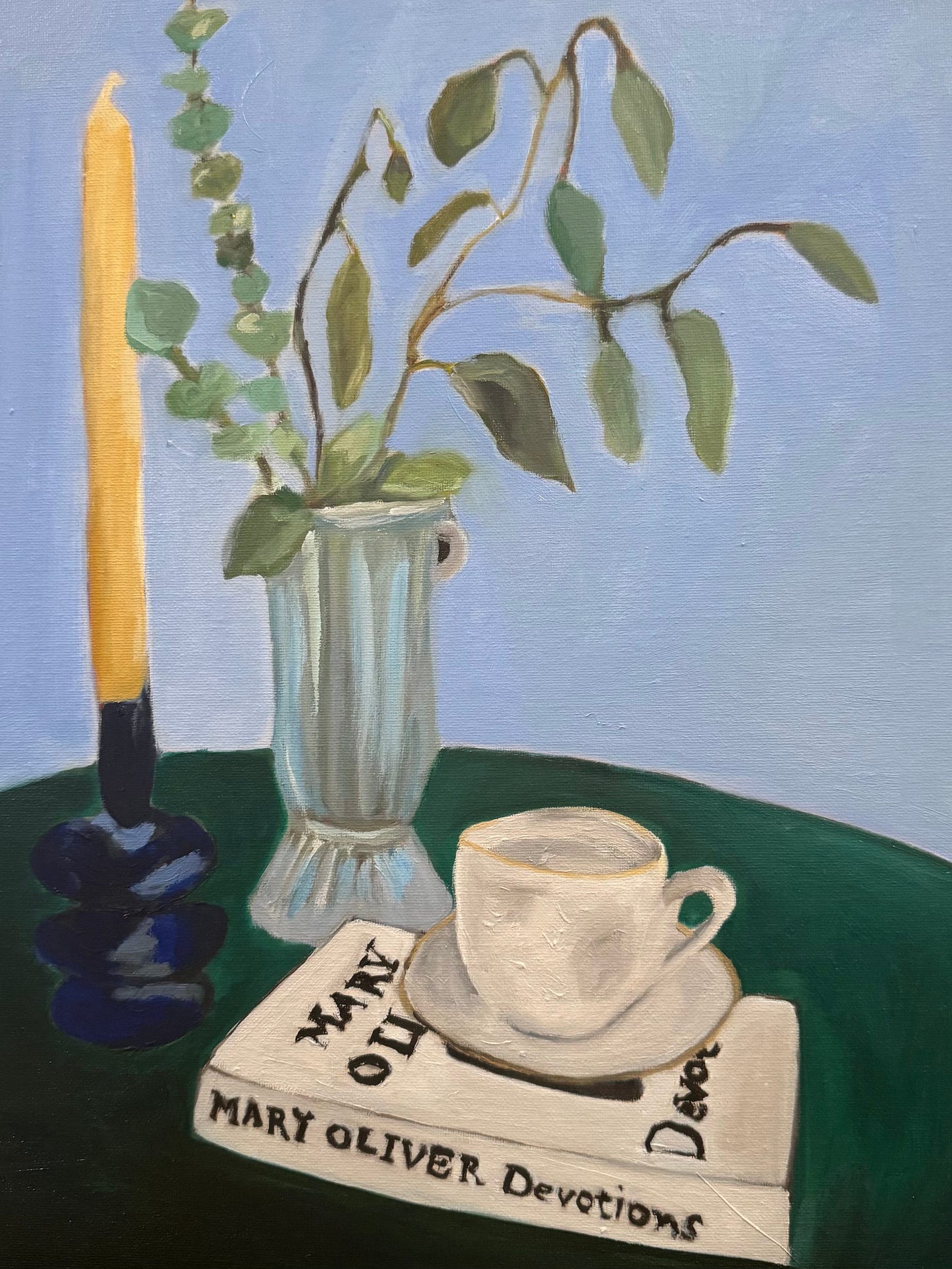

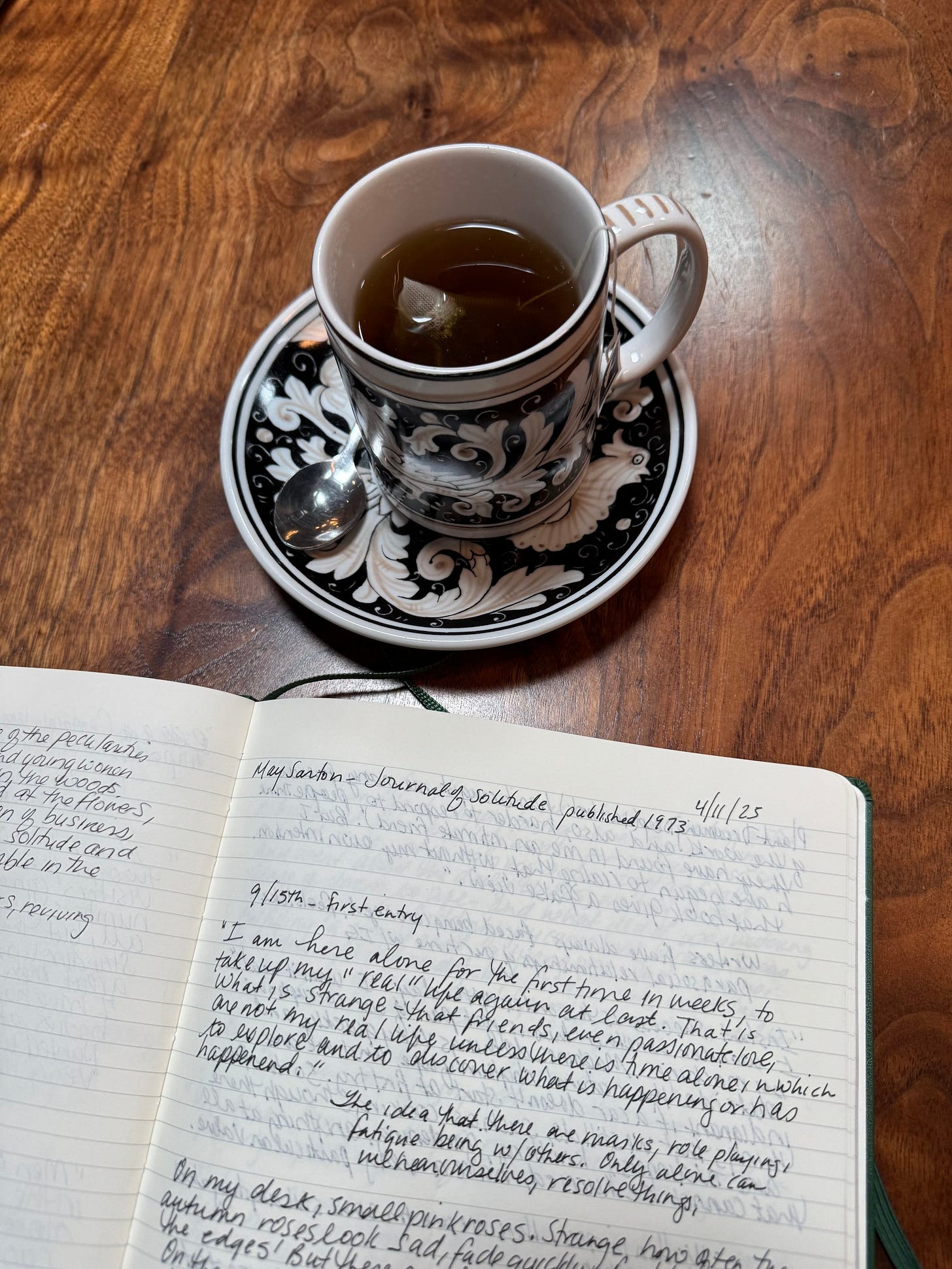


I started to follow Janet because of her artwork, but now I want to explore more. I love to meet people that are also visual artists (I'm one myself), great creatives and book lovers. Furthermore, she's beautiful! From all the tips, I'm tempted to start tracking my readings in a physical notebook 🧐 that might be liberating!
Tip - sip in a poem daily and take note of what is happening around you.
Reading Ritual - my book journal. Letting a week, or so pass, and then sitting down and reflecting. I love a first sentence/last sentence recording - I feel like when I look back my brain fills in so much of the book experience. Then taking the pause to record what quote really spoke to me in my commonplace journal. Side note: still thinking about my reading kinks! After reading Brandy Sour, it might be setting in hotels. The mix and interactions of the guests and staff. Going into The Feast soon.